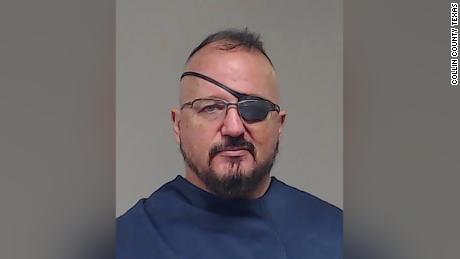At some point, those defendants will have an arraignment for them to enter their plea to the new seditious conspiracy charge, but those proceedings have not been scheduled yet,
At a hearing Friday afternoon before Magistrate Judge Deborah Fine in Phoenix that lasted less than 10 minutes, Vallejo -- who appeared virtually from the Central Arizona Florence Correctional Complex -- was ordered detained until another hearing scheduled for January 20, where his detention pretrial will be further discussed. Coincidentally, that will mark one year after Biden's inauguration.
Vallejo's public defender, Debbie Jang, told the court he intended to plead not guilty to all charges against him, although a formal plea was not requested at Friday's hearing. Vallejo was wheeled up to his videoconference camera strapped into a chair, wearing an orange jumpsuit and black face mask. He told Fine he plans to hire his own attorney as soon as possible but that he has not been able to get in touch with his preferred lawyer yet.
Prosecutors accuse Vallejo of transporting weapons and coordinating with Rhodes a so-called "quick reaction force" team for January 6.Rhodes -- the leader of the far-right Oath Keepers -- will appear before Magistrate Judge Kimberly Priest Johnson in Plano, Texas, 2:30 p.m. CT on Friday.
It's possible at the hearing the Justice Department argues forcefully for the men to be held in jail, as they had done with several others in the case already, and prosecutors could even show evidence to the court to convince the judges they could be dangerous
Those discussions may continue when their cases -- as is expected -- move to DC's federal court, where the other January 6 prosecutions are proceeding.
Rhodes has previously denied wrongdoing.
Prosecutors' decision to bring the charge seditious conspiracy carries symbolic and political weight; the relevant statute dates back to the Civil War-era. But it is also a risk for prosecutors, as use of the charge in the past -- most recently in a 2010 case concerning a militia plot in Michigan -- has faltered under scrutiny from judges.


Booking photo of Oath Keepers leader Stewart Rhodes.From Collin County, Texas
Attorney General Merrick Garland had been reluctant to bring the charge, CNN previously reported, but prosecutors in the latest indictment were able to show granular details of alleged planning and logistics coordination among the defendants in the lead up to the Capitol attack. Of particular note are the accusations in the new filings that Rhodes, Vallejo and other defendants continued plotting even after the riot to disrupt the peaceful transfer of power.
Before the seditious conspiracy charge was brought, a central charge in DOJ's Oath Keeper case was conspiracy to obstruct an official proceeding. US District Judge Amit Mehta recently rejected the request by several Oath Keeper defendants that he throw that charge out, and its use has been upheld by other judges presiding over separate January 6 cases.
Several Oath Keepers who do not currently face the seditious conspiracy charge brought by the DOJ Thursday face a conspiracy obstruction charge. That charge, as well as the seditious conspiracy charge, carries a 20-year maximum prison sentence.
Four of those indicted in the DOJ's Oath Keepers' prosecutions are known to be cooperating with the government.This story has been updated with developments Friday.
CNN's Bob Ortega, Andy Rose, Katelyn Polantz, Evan Perez, Hannah Rabinowitz and Marshall Cohen contributed to this report.

Post a Comment